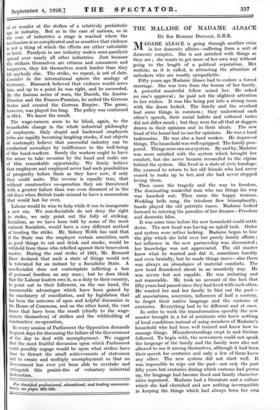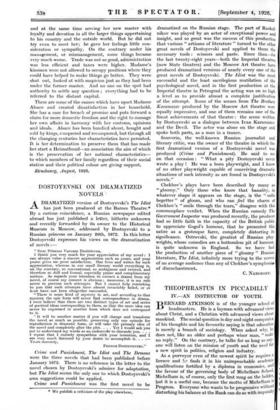THE MALAISE OF MADAME ALSACE
BY SIR ROBERT DONALD, G.B.E.
MADAME ALSACE is going through another crisis in her domestic affairs—suffering from a sort of domestic complex. She is not satisfied with things as they are ; she wants to get more of her own way without going to the length of a political separation. Her malaise, as it is called, is attracting the attention of onlookers who are mostly sympathetic.
Fifty years ago Madame Alsace had to endure a forced marriage. She was torn from the bosom of her family. A powerful masterful fellow seized her. He asked no one's approval ; he paid not the slightest attention to her wishes. It was like being put into a strong room with the doors locked. The family and the overlord had some things in• common ; they understood each other's speech, their social habits and cultured tastes did not differ much ; but they were for all that at daggers drawn in their opinions and in their ideals. The new head of the house had no use for opinions. He was a hard taskmaster. He was also a hard worker. He improved things. The household was well equipped. The family pros- pered. Things were run on a system. By and by, Madame was more satisfied with the system which brought her comfort, but she never became reconciled to the regime behind the system. She lived in a state of civic bondage. She yearned to return to her old friends who had never ceased to make up to her, and she had never stopped loving them.
Then came the tragedy and the way to freedom. The dominating masterful man who ran things his way was knocked out. Then came the happy reunion. Wedding bells rang, the tricolour flew triumphantly, bands played the old patriotic tunes. Madame looked forward. to entering the paradise of her dreams—Freedom and domestic bliss.
It was some time before the new household could settle down. The new head was having an uphill task. Order and system were rather lacking. Madame began to lose the grip which she held over her purely family affairs ; her influence in the new partnership was. discounted ; her knowledge was not appreciated. The old master knew what he wanted and did it, sometimes harshly and even brutally, but he made things move—also there was always an abundance of material comforts. The new head floundered about in an unorderly way. He was severe but not capable. He was irritating and not reasonable. He took no account of the fact that fifty years had passed since they had lived with each other. He wanted her and her family to blot out the past— all associations, souvenirs, influences of half a century, to forget their native language and the customs of centuries. Everything had to be different and at once.
In order to work the transformation speedily the new master brought in a lot of assistants who knew nothing of local conditions instead of using members of Madame's household who had been well trained and knew how to manage things. Misunderstandings crept in and friction followed. To begin with, the newcomers could not speak the language of the family and the family, were also not allowed to use it among themselves, although it had been their speech for centuries and only a few of them knew any other. The new system did not start well. It was impossible to wipe out the past—not on',- the past fifty years but centuries during which customs had grown up, the language had become fixed and family character- istics ingrained. Madame had a literature and a culture which she had cherished and saw nothing incompatible in keeping the things which had always born her own and at the same time serving her new master with loyalty and devotion in all the larger things appertaining to his country and the outside world. But he did not try even to meet her; he gave her feelings little con- sideration or sympathy. On the contrary under his management, or mismanagement, some things became very much worse. Trade was not so good, administration was less efficient and taxes were higher. Madame's kinsmen were not allowed to occupy positions where they could have helped to make things go better. They were shut out, looked at with suspicion just as they had been under the former master. And no one on the spot had authority to settle any question ; everything had to be referred to the distant capital.
These are some of the causes which have upset Madame Alsace and created dissatisfaction in her household. She has a case for breach of promise and puts forward a claim for more domestic freedom and the right to manage her own affairs in harmony with her customs, opinions and ideals. Alsace has been bandied about, bought and sold by kings, conquered and reconquered, but through all the changing centuries her characteristics have persisted. It is her determination to preserve them that has made her start a Heimatbund—an association the aim of which is the preservation of her national characteristics— to which members of her family regardless of their social station and their political colour are giving support.
Strasbourg, August, 1926.



































 Previous page
Previous page